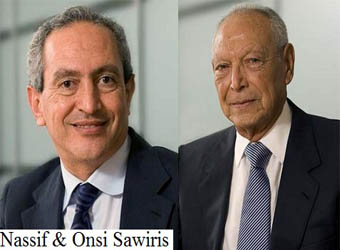The decision by Egypt’s general prosecutor to place the country’s wealthiest man and his business-tycoon father on a no-fly list sent the main stock index tumbling by 2.3%—the worst drop in a month. The travel ban on Nassef and Onsi Sawiris imposed on March 3rd led secular opposition groups to accuse Egypt’s Islamist government of pursuing a vendetta against the liberal opposition. It seemed to signal President Mohamed Morsi’s intention to prosecute businesses he believes benefitted from widespread corruption during the rule of Hosni Mubarak.
It was not the first travel ban for Onsi Sawiris, the octogenarian founder of the Orascom Group, Egypt’s largest private employer. Mr Sawiris’ first small construction company was nationalised under Gamal Abdel Nasser in the 1960s, and he was prevented from leaving the country for six years. He moved to Libya in 1971 but returned five years later, founding Orascom, which grew into a multinational conglomerate that he passed on to his three sons, turning all four men into billionaires.
The Sawiris family, who are Coptic Christians, have been at odds with Mr Morsi’s Muslim Brotherhood-led government since Egypt’s revolution. Naguib Sawiris, Onsi’s outspoken eldest son, said in an interview on Egyptian television on March 5th that his family was being “deliberately targeted” by the government. He said his father and brother believe that the tax case against them arose when ONTV, a satellite channel that he used to own, came out against the Islamists.
Naguib Sawiris’ family left Egypt last summer, after he received “personal, bodily, family, [and] business” threats, said Naguib Abadir, a co-founder of the the Free Egyptians, Mr Sawiris’ political party. Mr Sawiris has received threats in the past; in 2011 after he tweeted a picture of Mickey and Minnie Mouse dressed as conservative Muslims. But the danger is more serious this time, explained Mr Abadir who believes this marks the start of the government’s persecution of opposition figures: “They will go after them, one after the other.”
Mr Sawiris had been divesting from his Egypt-based enterprises before the revolution but accelerated the pace as the Brothers and more conservative Salafist parties gained power. In May 2012, a month before Mr Morsi became president, Mr Sawiris sold most of his remaining shares in Mobinil, one of the country’s three mobile operators. Last December, he sold ONTV to a Tunisian businessman.
The travel ban is the result of a tax claim targeting Orascom Construction Industries (OCI) (OCIC.CA), the largest company on the Egyptian Exchange, owned by another Sawiris brother, Nassef. In February, Nassef decided to delist OCI from the exchange and relocated it to the Netherlands, where it will be traded on the Dutch market. The move came amid negotiations with the Egyptian tax authority over 14 billion Egyptian pounds ($2.7 billion) the government says OCI owes in unpaid taxes from a 2007 deal to sell a concrete-manufacturing subsidiary to Lafarge, a French company, for 66.4 billion Egyptian pounds. Orascom denies the government’s claim, saying the deal was approved under the law at the time and that it has been notified only of a much smaller amount owed, 4.7 billion Egyptian pounds.
Such prosecutions worry both foreign investors and the various CEOs who have fled Egypt since the revolution. The government is anxious to lure them home, but its efforts to investigate and prosecute those who allegedly benefitted illegally from the previous regime are not helping. The prime minister, Hisham Kandil, has promised that old contracts will be honoured, but in a speech last October Mr Morsi vowed to investigate and recoup 100 billion Egyptian pounds from corrupt companies.
The OCI saga is the most prominent case in what appears to be a government effort to limit capital flight and return funds to the state by undoing the privatisation deals of the Mubarak era. The Talaat Moustafa Group (TMGH.CA), owner of Medinaty, Egypt’s biggest property development, is currently embroiled in a lengthy lawsuit over whether it acquired its land through illegal bribes. Earlier this month, the Egyptian Financial Supervisory Authority placed a limit on the shares companies can transfer into global depository receipts, effectively ensuring no firm can replicate OCI’s move to the Netherlands.
Omar Darwazah, chief of investor relations for OCI, says the case against the company is a “microcosm” of Egypt’s post-revolution economic woes and a “witch hunt” that will dampen investor interest. “The government is playing Russian roulette and not thinking about the consequences,” Mr Darwazah said.
The Economist



